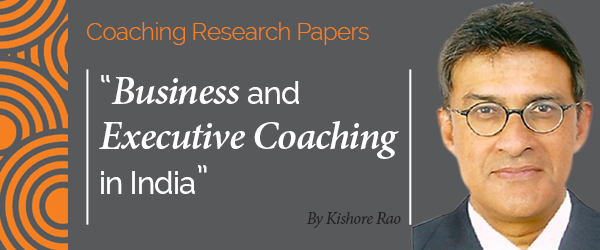 Research Paper By Kishore Rao
Research Paper By Kishore Rao
(Business and Executive Coach, INDIA)
Introductory Note
This Research Paper explores Business and Executive Coaching Awareness and Acceptance in India as prevalent today. The Research has been prompted by the writer’s own experience as an executive in the corporate world in the recent past.
Some of the observations were (in the India context):
The Research paper structure is as follows:
(Focused primary research through an online Survey)
It would be presumptuous to assume that this paper would be the final statement on Business and Executive Coaching as practiced in India. The Research will however reveal the whys and why nots of Company decisions on making Business/Executive Coaching as an important Organization Development intervention, current practices and recommendations to improve acceptability from a corporate client’s viewpoint.
Global Practices and Insights
The primary sources in this section are from two papers published by the Harvard Business Review in late 2008 and the Korn Ferry Institute in 2009.
According to the Harvard Business Review (HBR) Executive coaching is a confidential, individually-tailored engagement designed to meet the needs both of the executive being coached and the organization paying for the service. A coach meets behind closed doors with an executive, and together they create personalized goals and explore specific ways to achieve them. But what exactly happens behind those closed doors? Most of what is heard about coaching they conclude is anecdote and conjecture. HBR conducted this survey in late 2008 with 245 Coaches and practitioners. Some of the key findings were:
Engagement: As a group, executives take on a wide variety of tasks, but most of the coaching assignments fell into two categories: developing the capabilities of a high-potential executive or facilitating a transition (typically larger responsibilities or moving to a new role to manage a different organization). That demonstrates that coaching today is less about fixing problem behaviours and more about enhancing the performance of valued executives. Nearly all of the engagements were usually from seven to 12 months.
The Work – Coaching provided multiple benefits to the client. The Coaches by and large summarised the outcomes in two words : “It works!” More specifically, as the 21st century brings rapid change and massive amounts of information, coaching helps executives manage business complexity. Leadership development was a key area and many coaches bemoaned the paucity of developmental resources for high-level leaders. Coaching was also seen as creating a unique and safe space for executives and as a replacement for in-house mentors who used to perform the coaching function at a time when executive turnover was slower and a culture of employment stability was the norm.
The Key Success Factors: Most coaches attributed their success to the chemistry between coach and executive, and the support of the organization rather than positioning themselves as masterful experts and professionals. Executives who are willing to learn and evolve and who can actively engage in the process, have the best results. Executives with significant character flaws or deep-seated behavioural problems were reported as poor coaching candidates.
Choosing a Coach: The two most common responses were that the coach should have prior experience coaching in a similar setting, and he or she should be able to clearly explain the methods employed and why. Most reported that interviewing skills were paramount. Seventy-seven percent cited the 360-degree feedback instrument. Next in importance were shadowing, peer support groups, cultural assessment, and psychometrics (39%–46% rated these tools as highly important).
The Future: Coaching exists to help executives find solutions, yet the field of coaching, the report highlighted, must solve a few problems itself. It was reported that coaching as a process is highly effective but that the field feels as if it is in “adolescence.” Many were concerned that lack of entry barriers leaves the profession vulnerable to being discredited by charlatans. Many also felt that action was needed to winnow out bad or ineffective coaches. Some suggested that an emphasis on more rigors in practice and more research on effectiveness is needed
HBR Conclusion
Executive coaching does appear to be creating a space for itself in the corporate landscape, particularly with the shift toward coaching high performers. The open-ended responses often showed a surprising congruence, but sometimes lively disagreement, about where coaching needs to go from here. Although many individual coaches are skilful at helping individual companies and people, there is as yet no overarching definition, let alone organization, of the profession as a whole. Does executive coaching need such clarity to thrive? Ultimately, of course, organizations will decide.
The Korn Ferry Institute Study
Kenneth P. Demeuse, Senior Executive, Korn Ferry Institute, has this to say –
While executive coaching has increased markedly during recent years, the professional application of coaching, our understanding of when to use coaching, and the evaluation of its effectiveness has lagged far behind.
Korn Ferry also conducted a research to study executive coaching and it’s delivery effectiveness. The results show that executive coaching leads to a moderate to large amount of change in executives’ skills and/or performance. Assessing and addressing an executive’s coachability is necessary for effective coaching.
The coaching field is filled with contradictions. Coaches themselves disagree over why they’re hired, what they do, and how to measure success (Coutu & Kauffman, 2009, p. 26).
The highlights of the Korn Ferry study were
Ultimately, a key question asked by companies and executives is whether coaching actually makes a difference on leadership behaviour and organizational performance… If one could demonstrate that executive coaching does work and where it works, coaches will be able to communicate realistic expectations to their clients.